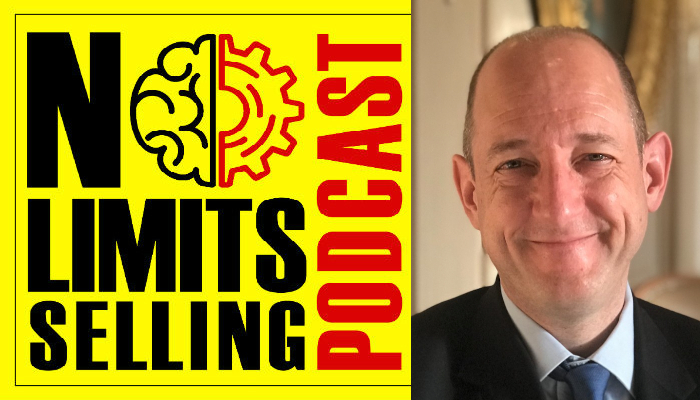Creating Magic in Digital Marketing
On Episode 241 of The No Limits Selling Podcast, we have Matthew Stibbe, CEO of Articulate Marketing. Matthew Stibbe is a serial entrepreneur, digital marketing maven, writer, pilot, and wine enthusiast. But not necessarily in that order. He created marketing strategies, content, and campaigns for clients including Microsoft, Google, LinkedIn, and HP and contributed to Wired, Forbes, and Popular Science.
Currently, he is CEO of Articulate Marketing, a UK marketing agency specializing in the technology sector. Also, his geek credentials are strong. Previously, he was the founder and CEO at Intelligent Games, a 70-person computer games company where he designed games for LEGO and produced two games based on Dune.
Matthew also has his commercial pilot's license and an advanced wine diploma. (Have you seen the film Somm? Like that!) At some point in the previous millennium, he studied history at Oxford University. These days, he blogs about modern management at www.geekboss.com, about marketing at www.articulatemarketing.com, and wine at www.vincarta.com.
In this episode, Matthew discusses tactics that create magic in the world of digital marketing.

Contact Matthew:
[EDITOR’S NOTE: This podcast is sponsored by No Limits Selling. It is a fun, fast-paced podcast that delivers hard-fought business advice that you can implement today to improve your sales and performance]
Interested In Our Real Estate Coaching Services? Explore Our Website: Link
Feeling Not Well Today? You Can Use Our Mindset Boosters App To amp Up Your Mood: Link
Find us on Social Media:
LinkedIn | Facebook community | Instagram
Like what do you listen to? Subscribe to our podcast!
Ready to become fearless? We can help you become fearless in 60 days so you accomplish more in your career Schedule A 15 min Call with Umar
Summary
Introduction and Background of Matthew Stibbe
The podcast begins with an introduction of Matthew Stibbe, the CEO of Articulate Marketing and Turbine. Matthew has a diverse background, having started as a writer and journalist before transitioning into entrepreneurship and digital marketing. He has a passion for aviation and has even combined this with his business ventures, creating a software company that caters to the aviation industry.
Articulate Marketing and Turbine
Matthew talks about his companies, Articulate Marketing, and Turbine. Articulate Marketing is a digital marketing agency that helps technology companies grow and succeed. Turbine, on the other hand, is a software company that provides online purchase orders, expense claims, and time off management. Matthew shares the challenges and successes he has experienced in running these businesses.
The Importance of Good Communication
Matthew emphasizes the importance of good communication in digital marketing and business. He believes that clear and effective communication is key to a company's success. He shares his insights on how to communicate effectively, both internally within the organization and externally with clients.
Challenges in Entrepreneurship
Matthew discusses the challenges he has faced as an entrepreneur. He talks about the difficulties of managing a team, dealing with financial pressures, and maintaining a work-life balance. Despite these challenges, Matthew remains passionate about his work and is motivated by the impact his businesses have on their clients.
Advice for Aspiring Entrepreneurs
Toward the end of the podcast, Matthew shares his advice for aspiring entrepreneurs. He encourages them to be resilient, adaptable, and patient. He also stresses the importance of learning from failures and using them as stepping stones to success. It all adds up to the overall success of your digital marketing enterprise.
Conclusion
In this insightful podcast, Matthew Stibbe, CEO of Articulate Marketing and Turbine, shares his entrepreneurial journey, starting from his roots as a writer and journalist to becoming a successful business owner. He discusses the operations of his companies, Articulate Marketing, a digital marketing agency for tech companies, and Turbine, a software firm providing online business management solutions. Matthew underscores the significance of effective communication in business success and delves into the challenges he has faced as an entrepreneur, such as team management, financial pressures, and work-life balance.
Despite these hurdles, his passion for his work and the impact his businesses have on clients remain his driving force. Offering advice to budding entrepreneurs, he emphasizes resilience, adaptability, patience, and the importance of learning from failures. The podcast concludes on an optimistic note, with Matthew expressing enthusiasm for future growth and innovation in his companies, reflecting on his entrepreneurial journey, and expressing gratitude for the invaluable lessons learned.
Faq
Who is Matthew Stibbe?
What is Articulate Marketing?
What is Turbine?
What does Matthew Stibbe believe is key to a company's success?
What challenges has Matthew Stibbe faced as an entrepreneur?
What advice does Matthew Stibbe have for aspiring entrepreneurs?
What are Matthew Stibbe's plans for the future of his companies?
Don’t miss this opportunity to transform your real estate career with one-on-one coaching. As an experienced real estate coach, I, Umar Hameed, am dedicated to helping you unlock your full potential and achieve your real estate goals. To learn more about who am I and my clients ↓
If you’re ready to take the next step, book an appointment with me today and begin your journey toward success in the real estate industry.
